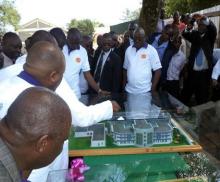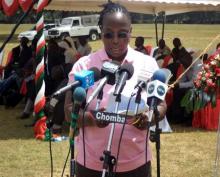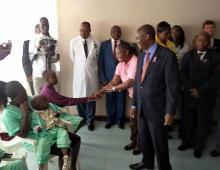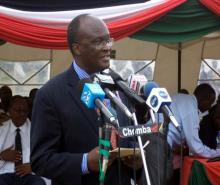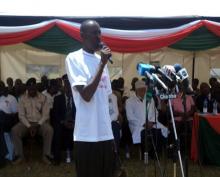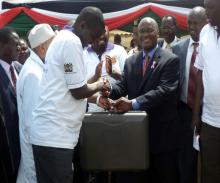Kenya Commemorates World Cancer Day 2014
04 February 2014, Nairobi – Kenya joined the rest of the world in commemorating this year’s World Cancer Day. The national event, commemorated in Eldoret, Uasin Gishu County, under the global theme “Debunking the Myths”, was graced by the Cabinet Secretary for Health, Mr. James Macharia.
The Chief Guest noted that the day provided a special opportunity to raise awareness and improve general knowledge and dispel myths and misconceptions about cancer.
Mr. Macharia stated that cancer is shrouded with myths and misconceptions affecting health seeking behaviors and treatment outcomes.
He urged those present to utilize the opportunity to educated themselves and get screened for cancer.
He noted that Kenya is one of the few countries in Africa which has legislated cancer prevention and control. He reported that the Ministry is committed to the full implementation of the Cancer Prevention and Control Act 2012 by establishing the National Cancer Institute. This institute will be instrumental in ensuring that there is coordinated implementation of all legislation touching on cancer and its risk factors.
Mr. Macharia noted with concern that about 80% of reported cases of cancer in Kenya are diagnosed at advanced stages, when the treatment is costly and the prognosis is poor. He said that his ministry in collaboration with partners in both public and private sector is in the process of improving the cancer prevention and control infrastructure and increasing the number of cancer specialists, which is currently very low and concentrated in the cities. This is intended to improve access to cancer treatment and thus reduce the long waiting times currently being experienced in the health facilities.
The Cabinet Secretary thanked partners and the Moi Teaching and Referral Hospital fraternity for supporting the development of a modern cancer prevention and control unit as part of the chronic diseases centre that is at an advanced stage of construction. He informed the guests that the ministry of health at national level was working to ensure that hospices and palliative care centres are available across the country for patients with terminal cancers and other chronic illnesses.
He reported that there were 11 functional centres in public referral hospitals and a further 25 are being established to improve access to palliative care. Mr Macharia, concluded by assuring Kenyans that the government is working hard to ensure that adequate resources are allocated to the healthcare sector to support cancer activities. He also urged the private sector to work with the Government in improving cancer prevention and care for patients in the country.
In her remarks on behalf of WHO Director General, the WHO Regional Director and the UN family, the WHO Country Representative Dr Custodia Mandlhate summarized some facts in regard to cancer. She reported that cancer kills many people in the African Region; it is estimated that about 12.4% of African Region’s 804 million inhabitants will develop cancer before the age 70; the risk of developing cancer increases with the age, indeed 90% of cancer cases will occur after the age of 40. Prevention, early detection, treatment and care can save about 100,000 lives annually by 2020.
Dr Custodia regrettably noted that there are a lot of myths and misconceptions about cancer and that we all need to know the truth to better protect ourselves. She went on to educate the guests on a few cancer facts. “Cancer is not caused by an injury such as a bump or a bruise; it is not contagious as it is one of the Non-Communicable diseases (NCDs); although infections by certain viruses or bacteria mat increase the risk of some types of cancer, no one can get cancer from another person; cancer is the uncontrolled growth and spread of body cells; it can affect almost any part of the body and often invade the surrounding tissue and can metastasize to distant areas,” she said.
She however noted that many cancers can be prevented by avoiding exposure to common risk factors, such as tobacco use, alcohol use, unhealthy diet and physical inactivity; and exposure to chronic infections from hepatitis B and C viruses and to human papilloma virus, these being the main cancer risk factors especially in low and middle income countries.
Dr Mandlhate concluded by saying that 40% of all cancers can be preventable if we all took action in the right direction. On this she reiterated the commitment of World Health Organization at different levels and the UN family in Kenya in working with the government, public and private partnerships in the fight against cancer in Kenya.
Others who made remarks at this occasion included the Governor of Uasin Gishu County Hon. Mandago who pledged to work closely with the national government in order to provide quality health care to its citizen. He noted that cancer treatment is very costly and will therefore emphasize the preventive aspect.
The Principle Secretary for Health, Prof Fred Sergor also emphasized preventive measures. He called on all to embrace screening services for early diagnosis and appropriate treatment. A representative of the US Government, Dr Kevin reported The US support to the government of Kenya in capacity building, research, and establishment of Cancer registry and also in tobacco control, a major risk factor of cancer.
Others who gave remarks on this day included the County Senators, Members of Parliament; the Director of Moi Teaching and Referral Hospital (MTRH) and testimonies from cancer survivors.
Educational and advocacy stands to provide education on cancer prevention, detection and treatment services to the public were erected on the ground.
Free screening services for various cancers, including breast, prostate and cervical were offered at the referral hospital. The free screening services were extended for three more days to accommodate the large turnout.




